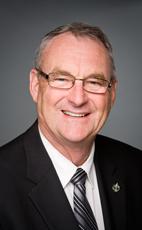Madam Speaker, I will be sharing my time with the member for Cypress Hills—Grasslands.
Okanagan—Shuswap happens to be in British Columbia. I would like members to know that. The member for Skeena—Bulkley Valley would lead the House to believe that there are no safety regulations and no oversight of marine traffic on the B.C. coast. My presentation will dispel this false perception.
Transport Canada is the lead federal department responsible for ship-source pollution. The department uses a number of measures to prevent ship-source spills, including regulations, enforcement of regulations through its inspection regime and surveillance, just to name a few.
While oil tankers have been transiting safely along British Columbia's coast for many years, Transport Canada ensures operators comply with the latest in vessel construction standards such as double hulling requirements for tankers, the International Safety Management code and mandatory port state control inspections if visiting a Canadian port. It ensures that they carry onboard shipboard oil pollution emergency plans and maintain an arrangement with a certified response organization in Canada in case of a pollution incident or threat of a pollution incident.
The 2001 Canada Shipping Act and its associated regulations and standards demand that the vessel owners operate well constructed and maintained vessels, crew those vessels with professional certified seafarers, have a safety management system onboard and maintain an appropriate level of preparedness at all times.
Transport Canada recognizes that because of the international nature of shipping, action to improve safety and pollution prevention in marine operations is most effectively carried out at an international level through the IMO. Global standards established at the IMO are prescribed in regulations under the 2001 Canada Shipping Act and apply to all vessels operating in waters under Canadian jurisdiction. In certain cases, stricter environment controls than the global standards may be required and implemented in our domestic regulations.
The provisions in annex I of the International Convention for the Prevention of Pollution from Ships, also known as MARPOL, have been incorporated into Canadian legislation through the regulations for the prevention of pollution from ships and for dangerous chemicals under the Canada Shipping Act, 2001. Transport Canada establishes regulations under the act and also under the Arctic Waters Pollution Prevention Act. Canadian ships must be built, maintained and operated according to regulations that help to prevent accidents and oil spills at sea.
Transport Canada's ship inspections are also an important means to prevent spills from ships. The department's marine safety inspectors board and inspect foreign ships at Canadian ports regularly. Those that do not meet safety standards are detained until their deficiencies have been corrected.
As per an International Maritime Organization agreement, Transport Canada has established regulations and standards requiring tankers to have double hulls, following international focus on mitigating the risk of oil pollution in the event of a tanker running aground.
These requirements are based on tanker tonnage, the year built and a phase-in schedule. As of January 1, 2010, all tankers except those less than 5,000 dead-weight tonnes built before July 1993 must be of double-hulled construction.
In addition to the double-hull requirements, under Canada's port state control program, Transport Canada inspects foreign ships and that includes tankers in Canadian ports.
The international port state control agreement requires Transport Canada to inspect 25% of all foreign vessels visiting Canadian ports by way of a port state control inspection.
Transport Canada also has a national policy that requires each region to inspect 100% of all tankers coming into ports on their first visit and at least once a year thereafter.
In the past five years, Transport Canada inspected 390 tankers and 1,600 other vessels in the ports of Vancouver, Prince Rupert and Kitimat.
Aerial surveillance by Transport Canada over all Canadian waters allows for detection of pollution from ships. Under the national aerial surveillance program, crews help to enforce domestic and international laws and gather evidence against polluters so that charges can be laid under the regulations. Regular aerial surveillance is a widely recognized and effective deterrent that reduces oil discharges in our waters, because potential polluters are aware that Canada has heightened surveillance.
During the last two years, crews observed some 11,000 vessels, more than 100 pollution sightings, of which approximately 20 were from ships, and just over 8,000 litres of oil on the ocean surface, a significant decrease compared to the two previous years. Three marine polluters were prosecuted in fiscal year 2008-09 as a result of the evidence gathered under the national aerial surveillance program. This demonstrates Transport Canada's commitment to the prevention of ship-source pollution.
In the Arctic, enforcement occurs through aerial surveillance reports from government ships and reporting through the long-range identification and tracking system, which automatically transmits and identifies the positions of vessels to authorities. Larger ships that intend to enter Canada's northern waters must report their position under the northern Canada vessel traffic services zones regulations.
Transport Canada works with pilotage authorities across Canada, which are responsible for providing safe, reliable and efficient marine pilotage services at ports in all geographic areas of the country. On the west coast, the Pacific Pilotage Authority is responsible for British Columbia's coastal waters, including the Fraser River. The authority also has five compulsory pilotage areas in place, where vessels must use certified pilots.
The prevention of oil spills is a priority of Transport Canada. Regulations, standards and programs demonstrate Transport Canada's commitment to prevention as well as preparedness and response capabilities in the unlikely event of a spill.

